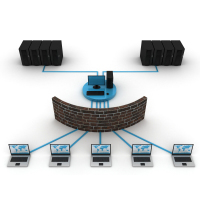A good network security policy is not a topic commonly spoke about around water coolers at work. This topic is more commonly handled by extensively-trained experts. Where this fact proves true, this does not mean that you have to be a well-trained professional to desire the knowledge of how a network security policy works. More than ever before, every day computer users are becoming well-versed in the basics of how important network security is with the internet. This article is intended to broaden the perspective of every-day network users in accomplishing an effective network security policy.

May I Introduce You to a Network?
In order to institute any type of network security policy, you must first understand the importance of network security, you must first understand what network security is. The definition of a “network” is “any set of interlinking lines resembling a net, a network of alliances”. Summing this definition up; it is a system where computers are interconnected to one another.
The Importance of a Network Security Policy
UUCP, like any other application No matter the application being utilized, each type of network security has its good points and its bad points. Some good points are that applications such as the UUCP (Unix-to-Unix CoPy) are very much limited which prove difficult in manipulating the application into doing things outside of its protocol. The good point is that the UUCP application works with having a UUCP user account and user password.
Any system that has this type of connection with other systems has to have the password otherwise, access is one-hundred denied. To add to the security of this network, authentication is required with sequence numbers. These numbers are incremented every time connections are instigated. Companies have come to realize the importance of network security and they have invested billions to ensure their confidential information is stored securely.
TCP/IP: Not just a jumble of alphabets
TCP/IP (Transport Control Protocol/Internet Protocol) is the official language of the information highway (internet).
What is an IP?
Simply put, an IP is a network layer protocol. This particular layer makes allowance for hosts to communicate among one another.
IPs Are Often Attacked
The reason IPs are consistently attacked is because of the accessibility factor. In other words, it proves easy to attack IPs. IPs do not normally have authentication methods in place and with no real way to prove where these attacks are coming from, IPs are left vulnerable.
Two Common Ways IPs Are Attacked
- Spoofing – One host will appear to have the IP address of another. This is a common strategy of attack.
- Hijacking – This method requires skill and expertise which makes this type of attack one of the most feared. This strategy entails someone literally taking over a computer session therefore, leaving all information vulnerable to the person attacking the IP. A sure sign of your IP being hijacked is viewing your session drop. Unbelievably, sometimes, attackers can be in control of your computer and you will never know it.
Common Security Network Threats
- Unauthorized resource access – these attacks are to access resources in your computer where they have been denied access.
- DOS (Denial of Service) – These attacks are outright ugly. These attacks also prove difficult to combat. They are easy to launch and almost difficult to track. The attacks consist of sending requests to your computer in huge multitudes which makes it difficult for your computer to handle. A connection is made through a service port with the end result typically with your computer being unable to handle all the requests.
- Breaches of confidentiality – This attack is recognized when a compromise of a normal user account on a computer accessing confidential information.
Attacks are fairly common, but now since I have successfully scared you to death in mentioning some of common attacks that can happen. I now want to list some tips to help protect your network. These tips should be listed in any company or private network security policy SOP (Standard Operating Procedures).
- Always have a backup – This proves common sense for anyone no matter if it’s your company network or private network. Always having a backup ensures data recovery in cases of emergencies and attacks.
- Always update your operating system patches – Do not ignore updates for system patches. When updates are ignored, this leaves your system vulnerable with old bugs. This is a popular way to access unauthorized computer systems.
- Have network security professionals on staff – Having a network security professional on the payroll is a great idea. These professionals are well-versed in reading advisories issued by response teams. They can also keep track of problems that are consistently arising. They should be well-trained in security while demonstrating their knowledge in protecting your computer network systems.
- Install firewalls – Firewalls are implemented in providing separation between the Internet and the intranet. Simply put, firewalls are components that form walls between two different networks.
Conclusion
Network security should be everyone’s business, not just the well-trained professionals. Security policies should be the concern of everyone within a business. Stringent cooperation is needed in adhering to network security which is why intelligent policies are greatly needed. Lastly, consistent safe and common sense practices will make the overall goal of a network security policy a true success for everyone.
